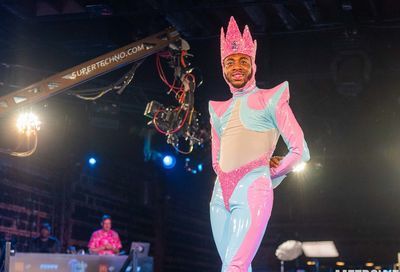Most Americans Oppose Trans Athletes Competing Based on Gender Identity
A poll by Gallup found that nearly 7 in 10 Americans believe transgender athletes should compete in sports based on their birth gender.

A new Gallup poll has found that opposition to transgender participation in sports, especially those designated for females, has increased over the past few years.
According to the poll, released Wednesday, an overwhelming majority of American adults believe that athletes should compete on teams corresponding to their birth gender, rather than their gender identity.
The poll surveyed 1,000 randomly selected adults living across the U.S. between May 1-24, 2023. Sixty-nine percent of respondents said they believe transgender athletes should be restricted to playing on teams that correspond to their assigned sex at birth.
The most recent numbers indicate an increase in opposition to transgender participation over the past few years, as a previous Gallup poll from 2021 showed that only 62% of respondents felt similarly at the time.
Just 6% of those who said they were Republicans thought transgender athletes should be allowed to compete on sports teams matching their gender identity, compared to 93% who thought transgender athletes should only play on teams that match their assigned sex at birth.
Democrats were more evenly divided, with 47% supporting allowing transgender individuals to play on teams that match their gender identity, and 48% saying that transgender athletes should only play on teams that match their birth gender.
Six percent of Democrats had no opinion on the question and 1% of Republicans had no opinion.
Independents largely oppose transgender participation on teams matching an athlete’s gender identity, with two-thirds saying such athletes should play on the team that corresponds to their gender assignment at birth.
For all subsets of respondents, fewer American adults supported transgender athletes competing on a team that matches their gender identity in 2023 than in 2021.
This increase in opposition to transgender participation in female-designated sports may be due to the proliferation of stories focusing on transgender female athletes who have excelled in certain competitions, besting their cisgender competitors often by large margins. These stories are particularly prevalent in right-wing media, and have been cited by conservatives as evidence of the physical advantages enjoyed by transgender females over cisgender females, thereby justifying restrictions on transgender participation.
The poll also asked participants about their personal moral views on gender transitions. Only 43% of Americans thought changing gender was morally acceptable, down from 46% in 2021.
Republicans overwhelmingly believe that attempting to change one’s gender, whether medically or legally, was morally unacceptable, with 84% holding that view. In contrast, 70% of Democrats believe changing one’s gender is morally acceptable, while independents are more divided, with 46% saying it is morally acceptable and 50% saying it is morally unacceptable.
Alabama Governor Kay Ivey recently signed a law expanding the state’s existing ban prohibiting transgender athletes from women’s sport teams to apply to collegiate athletics. In total, 22 states currently ban transgender athletes from competing on sports teams based on their gender identity, according to the Movement Advancement Project, which tracks the status of laws impacting LGBTQ people across the nation.
Other states have unsuccessfully attempted to pass transgender sports bans. Virginia Republican lawmakers introduced and passed a bill in the House of Delegates to prohibiting transgender women from participating on female-designated sports teams at the K-12 and collegiate levels, but the measure failed to pass the Democratic-led State Senate.
Proponents of transgender sports bans typically argue that they are needed to ensure fairness in competition and to protect women and girls from competing against athletes that have undergone male puberty, and thus enjoy a physiological advantage over them.
Eleven days before the poll was conducted, the U.S. House of Representatives passed a bill barring males, defined based on their biological sex at birth, from competing in women’s sports. The bill passed the Republican-controlled House along party lines but has not been taken up by the Democratic-led U.S. Senate. President Biden previously vowed to veto the bill should it make it to his desk.
While the Gallup poll and an increase in legislation targeting trans athletes appear to show increasing anti-transgender sentiment, Josie Caballero, the director of the U.S. Transgender Survey and special projects for the National Center for Transgender Equality, told NBC News that this same kind of political oscillation mirrors fluctuations in public opinion that occurred as marriage equality became a hotly debated issue in the early two decades of this century.
Caballero noted that the Gallup poll appears to show differences of opinion based on age, with younger generations expressing support for transgender people playing on teams that correspond to their gender identity. As Caballero pointed out, it is those younger generations who are the most supportive who are more likely to have had interactions with transgender athletes.
“They’re the ones playing the trans people,” she said. “They’re the ones in college, in school, and they’re the most accepting of all.”
Support Metro Weekly’s Journalism
These are challenging times for news organizations. And yet it’s crucial we stay active and provide vital resources and information to both our local readers and the world. So won’t you please take a moment and consider supporting Metro Weekly with a membership? For as little as $5 a month, you can help ensure Metro Weekly magazine and MetroWeekly.com remain free, viable resources as we provide the best, most diverse, culturally-resonant LGBTQ coverage in both the D.C. region and around the world. Memberships come with exclusive perks and discounts, your own personal digital delivery of each week’s magazine (and an archive), access to our Member's Lounge when it launches this fall, and exclusive members-only items like Metro Weekly Membership Mugs and Tote Bags! Check out all our membership levels here and please join us today!






























You must be logged in to post a comment.